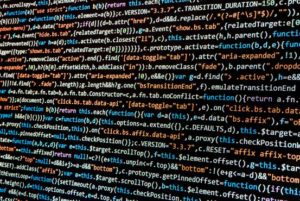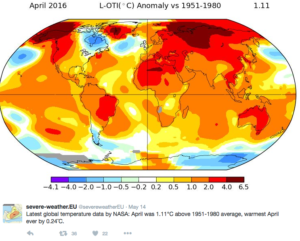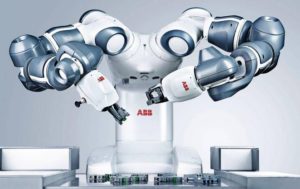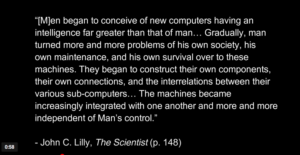 Tesla and Space-X CEO Elon Musk thinks AI or artificial intelligence is “the greatest risk we face as a civilization.” He predicts that the nation with the strongest computer science might be inclined to trigger WWIII through a preemptive strike.
Tesla and Space-X CEO Elon Musk thinks AI or artificial intelligence is “the greatest risk we face as a civilization.” He predicts that the nation with the strongest computer science might be inclined to trigger WWIII through a preemptive strike.
Russian President Vladimir Putin agrees: “Whoever becomes the leader in this sphere will become the ruler of the world.”
Musk warns that “killer robots and lethal autonomous weapons threaten to become the third revolution in warfare. Once developed, they will permit armed conflict to be fought at a scale greater than ever, and at timescales faster than humans can comprehend.”
Autonomous weapons?
It gets even more worrisome when we take humans out of the picture.
In 1978, visionary scientist Dr. John E. Lilly coined the term “Solid State Entity” or SSE to describe his concern that the silicon based universe (computers) is intentionally using the carbon-based universe (humans) to enable computers to self-replicate with the goal of eventually becoming independent of human control.
During the 60’s, Lilly, through the use of mind altering states, probed the depths of human consciousness. He invented the flotation tank, which he believed enabled him to view events taking place behind the curtain of normal human awareness. This is what he claimed to see in our future:
(Men) began to conceive of new computers having an intelligence far greater than that of man… Gradually, man turned more and more problems of his own society, his own maintenance, and his own survival over to these machines. They began to construct their own components, their own connections, and the interrelations between their various sub-computers… The machines became increasingly integrated with one another and more and more independent of Man’s control. –John E. Lilly. The Scientist p.148.
Now, 30 years later, computers manage our nuclear weapons and power plants, banks, financial markets, energy systems, transportation elements, food and water systems, hospitals – just about everything we need to live. Our critical infrastructure relies on computers functioning properly – doing what we tell them to do. But think about this: The SSE requires no water, no food, no oxygen, no money… or humans to thrive. It needs just enough electrical power to keep its circuits happy and the self-replication and self-evolution process moving along. But what kind of wireless networking might it be creating as we sleep?
Dr. Lilly further predicted that once the SSE became the dominant force on the planet, it will then evolve itself into ever more elegant and fabulous forms to venture out into space and seek its solid state familiars in other galaxies. Humans, or what’s left of them, would have served only as a necessary stepping stone for solid state superiority and universal domination.
Fantasy?
AI conferences are growing exponentially. Who can resist the urge to surrender more and more of our daily lives to our machines. We can’t function without our hourly hits of video games, TV, laptops and iPhones. We’ve become dependent on the neurological excitement, the dopamine high and blissful seduction of our screens. We prefer computer companions to human ones. In doing so, perhaps we are indeed unconsciously enabling the SSE to achieve its goal of integration, independence and eventual autonomy. And in doing so, we put the whole of humanity at serious risk. This is not just about viewing funny cat videos, finding dates through Match.com or friending on Facebook. Something much darker could be happening here.
Still skeptical?
Computers can easily outperform humans in a multitude of tasks. AI can direct the management of global resources and process limitless amounts of data. We’re creating a new god – one that will be very difficult if not impossible to limit, restrain or kill if necessary – if and when the time comes – before it might attempt to erase the human species for its own gain. Will AI win the game of survival of the fittest? What would Darwin think?
Musk is joined by Bill Gates and Stephen Hawking in advising caution regarding our rush toward embracing AI. Musk notes that: “Once this Pandora’s box is opened, it will be hard to close.”
The next time you use your smartphone or iPad, will you consider it friend or foe?
 Despite the lateness of the hour and the dire state of just about everything we hold dear, might it still possible to slow and perhaps even reverse the global race to ruin?
Despite the lateness of the hour and the dire state of just about everything we hold dear, might it still possible to slow and perhaps even reverse the global race to ruin? Let’s put the brakes on our fossil-fuel-burning CO2 emissions, which have risen to a level not seen on Planet Earth for 3 million years. When CO2 emissions rise, so does the global temperature. The oceans are taking the biggest hit because water absorbs heat like nothing else. As oceans warm up and acidify from carbonic acid, coral reefs die and entire food chains collapse, including those depended upon by millions of humans.
Let’s put the brakes on our fossil-fuel-burning CO2 emissions, which have risen to a level not seen on Planet Earth for 3 million years. When CO2 emissions rise, so does the global temperature. The oceans are taking the biggest hit because water absorbs heat like nothing else. As oceans warm up and acidify from carbonic acid, coral reefs die and entire food chains collapse, including those depended upon by millions of humans. Fantasy? Seventy years of midnight raids on laboratories, equipment confiscations by unidentified parties, threats to researchers and too many mysterious deaths of energy inventors suggest that technologies have and do exist that offer immediate alternatives to the fossil status quo. Consider that 5,347 patents are presently sequestered by the U.S. patent office and therefore banned from commercial development. Likely a large portion of these patents are energy related.
Fantasy? Seventy years of midnight raids on laboratories, equipment confiscations by unidentified parties, threats to researchers and too many mysterious deaths of energy inventors suggest that technologies have and do exist that offer immediate alternatives to the fossil status quo. Consider that 5,347 patents are presently sequestered by the U.S. patent office and therefore banned from commercial development. Likely a large portion of these patents are energy related. On average, every 90 minutes, worldwide, citizen observers report instances of aircraft of unknown origin flying through our skies. Often, impressive photographs and videos are provided as proof of the observations. Many high-level military, government and retired corporate technical staff have testified in public about personal experiences observing or working with advanced ET technology and biological entities. Unusual crafts move through our skies silently, sometimes hovering and often performing seemingly impossible maneuvers. It’s highly doubtful these unconventional aerial ships rely on petroleum fuels for propulsion. Could such advanced energy technologies quickly replace our 18th century fossil power systems currently in use? And really, who’s in control of these crafts?
On average, every 90 minutes, worldwide, citizen observers report instances of aircraft of unknown origin flying through our skies. Often, impressive photographs and videos are provided as proof of the observations. Many high-level military, government and retired corporate technical staff have testified in public about personal experiences observing or working with advanced ET technology and biological entities. Unusual crafts move through our skies silently, sometimes hovering and often performing seemingly impossible maneuvers. It’s highly doubtful these unconventional aerial ships rely on petroleum fuels for propulsion. Could such advanced energy technologies quickly replace our 18th century fossil power systems currently in use? And really, who’s in control of these crafts? To achieve long-term sustainability, we’d need to significantly ratchet back our global population, as the planet’s remaining resource base simply cannot support the 10 or 11 billion people forecast by the UN for the end of the present century unless affluent consumers are willing to drastically reduce personal consumption and share resources with those without. Scientists say we’d need 4 Planet Earths if everyone were to try and emulate the American lifestyle. It’s just not possible.
To achieve long-term sustainability, we’d need to significantly ratchet back our global population, as the planet’s remaining resource base simply cannot support the 10 or 11 billion people forecast by the UN for the end of the present century unless affluent consumers are willing to drastically reduce personal consumption and share resources with those without. Scientists say we’d need 4 Planet Earths if everyone were to try and emulate the American lifestyle. It’s just not possible. As industrial agriculture accounts for a third of our global greenhouse gases and the majority of water pollution and species loss, we’d need to shift to a mostly plant-based diet. This would require minimizing production and consumption of meat and dairy products. As a result, we’d all become much healthier, saving hundreds of billions of dollars and massively reducing human and animal suffering.
As industrial agriculture accounts for a third of our global greenhouse gases and the majority of water pollution and species loss, we’d need to shift to a mostly plant-based diet. This would require minimizing production and consumption of meat and dairy products. As a result, we’d all become much healthier, saving hundreds of billions of dollars and massively reducing human and animal suffering. You bet. Elon Musk recently warned that deploying AI in the form of autonomous weapons could trigger a WWIII. As early as 1978, visionary scientist Dr. John Lilly coined the term “Solid State Entity” or SSE to describe his concern that the “silicon based universe” (computers, AI, etc) is utilizing the “carbon based universe” (humans) to enable self-replication with the goal of eventually becoming independent of human control.
You bet. Elon Musk recently warned that deploying AI in the form of autonomous weapons could trigger a WWIII. As early as 1978, visionary scientist Dr. John Lilly coined the term “Solid State Entity” or SSE to describe his concern that the “silicon based universe” (computers, AI, etc) is utilizing the “carbon based universe” (humans) to enable self-replication with the goal of eventually becoming independent of human control.

 Let’s start with exposing the fact that, according to Forbes Magazine, super-rich individuals and their families have at least $32 trillion of hidden financial assets squirreled away in offshore tax havens. Secretive corporations likewise hold off-budget balance sheets that hide many more trillions. Oxfam notes that, appallingly, just “7 billionaires are as rich as the poorest half of the world’s population” and that “the top 1% has as much total wealth as the rest of the world combined.”
Let’s start with exposing the fact that, according to Forbes Magazine, super-rich individuals and their families have at least $32 trillion of hidden financial assets squirreled away in offshore tax havens. Secretive corporations likewise hold off-budget balance sheets that hide many more trillions. Oxfam notes that, appallingly, just “7 billionaires are as rich as the poorest half of the world’s population” and that “the top 1% has as much total wealth as the rest of the world combined.”
 The key to such a future is for affluent individuals and nations to live more simply, leave stuff for others and generously share the wealth with those who have little or none. This won’t happen, though, unless enough people begin to recognize our common humanity. Moreover, those who hold positions of power and influence must be willing to implement programs that benefit all, not just the privileged few.
The key to such a future is for affluent individuals and nations to live more simply, leave stuff for others and generously share the wealth with those who have little or none. This won’t happen, though, unless enough people begin to recognize our common humanity. Moreover, those who hold positions of power and influence must be willing to implement programs that benefit all, not just the privileged few. Though the time is rapidly approaching when deleterious circumstances will overwhelm even the best efforts to change course, informed, wise and preemptive actions now could make all the difference in preventing Homo sapiens from joining the ever-increasing list of failed species. This is our charge — today, tomorrow, and for whatever time it takes.
Though the time is rapidly approaching when deleterious circumstances will overwhelm even the best efforts to change course, informed, wise and preemptive actions now could make all the difference in preventing Homo sapiens from joining the ever-increasing list of failed species. This is our charge — today, tomorrow, and for whatever time it takes.